

Achieving at a high level is not easy. No matter the field, be it business, sports, performance, or academics, achievement usually requires some level of sacrifice. For example, acceptance into competitive colleges requires not just the right grades, but also a robust mix of extracurricular activities, volunteer work, and character development. I’ve recently had clients as young as 6th grade discuss how running for student council will affect their college applications. These expectations are one factor in the rapid increase of anxiety in youth and can also create a difficult situation for parents. Knowing when to push and when to protect can be a delicate balancing act. These 5 steps can help parents support achievement while ensuring healthy mental and emotional habits are developing.

- Help your student track extracurricular activities and homework. Knowing how many hours are involved in an activity helps to establish perspective and identify needed changes. This knowledge can also serve as an indicator of over scheduling. A recent study from Stanford and Villanova researchers found that students from high achieving schools with more than 15-20 total hours of extracurriculars report higher levels of stress, depression, stomach ailments, and other physical and emotional symptoms.
- Tap into internal motivation. When difficult tasks are connected directly to something we care deeply about, the task becomes easier. A student who struggles in math might resist doing homework. However, if that student deeply cares about maintaining eligibility for volleyball and connects the two, internal motivation can develop. Bonus: More internal motivation means less motivation is required from external sources, including parents.
- Teach that more doesn’t always equal better. Efficient habits help to reduce both time and effort. 30 minutes of focused studying are usually better than 2 hours of combination phone/tv/studying. Increased efficiency can help support additional free time as well. Speaking of free time…
- Schedule unstructured free and family time. Humans need time to recharge and relax. Treat unstructured time like other important activities by blocking it out on calendars and maintaining consistency. Increases in free time for high achieving individuals have been linked to increased creativity and innovation.
- Talk to your kids. Frequent, honest communication with your child will help you gauge when pressure goes beyond normal stress. Striving for a non-judgmental yet consistent tone in this communication helps to establish parents as an ally rather than an opponent during difficult moments.
Achieving at a high level is rarely, if ever, easy. When we help children to develop healthy practices around achievement we help them develop skills for a more balanced life.
